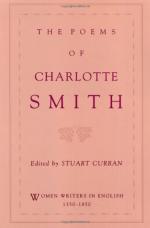|
This section contains 2,895 words (approx. 10 pages at 300 words per page) |

|
SOURCE: Bray, Matthew. “Removing the Anglo-Saxon Yoke: The Francocentric Vision of Charlotte Smith's Later Works.” The Wordsworth Circle 24, no. 3 (summer 1993): 155-58.
In the following essay, Bray examines the increasingly pro-French version of the history of English-French relations.
Charlotte Smith initially opposed the British war with France for humanitarian reasons. In her polemical blank-verse poem, The Emigrants (1793), for instance, Smith argues that her fellow country men and women should derive national pride from “acts of pure humanity” toward French ecclesiastical emigrés displaced by the Revolution rather than from “the deafening roar / Of Victory from a thousand brazen throats, / That tell with what success wide wasting War / Has by our Compatriots thinned the world” (33-34). During the Napoleonic era, however, Smith's opposition to the war moved beyond mere humanitarian pacifism. From 1798 until her death in 1806, she articulated an increasingly seditious vision of England's historical and political ties to France...
|
This section contains 2,895 words (approx. 10 pages at 300 words per page) |

|


